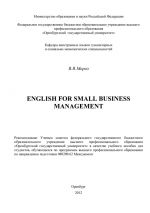Правообладателям!
Представленный фрагмент книги размещен по согласованию с распространителем легального контента ООО "ЛитРес" (не более 20% исходного текста). Если вы считаете, что размещение материала нарушает ваши или чьи-либо права, то сообщите нам об этом.Читателям!
Оплатили, но не знаете что делать дальше?
Текст бизнес-книги "English for Small Business Management"
Автор книги: Виктория Мороз
Раздел: Учебная литература, Детские книги
Текущая страница: 1 (всего у книги 1 страниц)
В. В. Мороз
English for Small Business Management
Introduction
Данное учебное пособие предназначено для обучения студентов направления подготовки 080200.62 Менеджмент чтению специальной литературы как самостоятельно, так и в аудитории.
Цель данного учебного пособия – изучить ключевые темы в области управления предприятий, расширить как терминологический словарный запас, так и общеупотребительной лексики, развить умения извлекать необходимую информацию, анализировать и систематизировать ее.
Учебное пособие включает в себя пять разделов, состоящих из специальных текстов, упражнений на освоение и закрепление лексики, грамматических упражнений, глоссария, а также проектных заданий и заданий практической направленности.
В каждом разделе предлагаются специализированные тексты, предназначенные как для самостоятельной, так и для аудиторной работы с использованием технологии развития критического мышления, что позволяет сформировать у студентов навыки работы с текстом, в группе и самостоятельно, не только при изучении иностранного языка, но и других дисциплин.
Тексты в разделах сопровождаются упражнениями на развитие навыков работы со словарем, расширение словарного состава как общеупотребительной, так и профессиональной лексики. Каждый раздел завершается упражнениями практической направленности для закрепления пройденного материала.
1 Unit 1. Family Business Opportunities
1.1 Class work. The family business: a unique institution
1.1.1 Exercise 1. Draw a family tree arranging the following words in a proper order
Son, daughter, mother, father, sister, brother, grandparents, nephew, niece, cousin, aunt, uncle, wife, husband, spouse.
1.1.2 Exercise 2. Before you read, make a chart and put down everything you know about family business
1.1.3 Exercise 3. Divide the class into groups of four to read texts A, B, C, and D. Then share the information read with the group mates
1.1.3.1 Text A. What Is a Family Business?
Vocabulary Notes:
entrepreneurship – предпринимательство;
to strive for – прилагать усилия, стараться, стремиться;
to pursue – заниматься ч. – л., иметь профессию;
to distinguish – отличать, выделять, служить отличительным признаком;
to keep the books – вести бухгалтерские книги;
to some extent – в некоторой степени.
One of the routes to entrepreneurship is that of entering a family business. Many sons and daughters of business owners have the option of joining the firm founded by their parents or grandparents. Family leaders may, in fact, strive for continuation of a family business over several generations, thereby creating opportunities for children or other relatives to pursue entrepreneurship in that business. Young family members must then decide, often during their college years, whether to prepare for a career in the family business. This decision should be based on an understanding of the dynamics of such a business. A number of features distinguish the family firm from other types of small businesses. Its decision making, for example, involves a mixture of family and business values.
Family business – a company in which family members are directly involved in the ownership and/or functioning

A family business is characterized by ownership or other involvement by two or more members of the same family in its life and functioning. The nature and extent of that involvement varies. In some firms, family members may work full-time or part-time. In a small restaurant, for example, one spouse may serve as host and manager, the other may keep the books, and the children may work in the kitchen or as servers.
Most family businesses are small. However, family considerations may continue to be important even when such businesses become large corporations. Companies such as WalMart Stores, Levi Strauss and Company, Ford Motor Company, and Marriott Corporation are still recognized, to some extent, as family businesses.

1.1.3.2 Text B. Family and Business Overlap
Vocabulary Notes:
to overlap – частично совпадать, перекрывать;
to nurture – выращивать, воспитывать, обучать;
in the short run – в ближайшем будущем, в ближайшее время;
tension – напряжение, напряженное состояние;
consistent – последовательный, стойкий;
to be concerned with – иметь отношение, касаться.
Any family business is composed of both a family and a business. Although these are separate institutions – each with its own members, goals, and values – they overlap in the family firm.
Families and businesses exist for fundamentally different reasons. The family's primary function relates to the care and nurture of family members, while the business is concerned with the production or distribution of goods and/or services. The family's goals are the fullest possible development of each member, regardless of limitations in ability, and the provision of equal opportunities and rewards for each member. The business's goals are profitability and survival. These goals may be either in harmony or in conflict, but it is obvious that they are not identical. In the short run, what's best for the family may or may not be what's best for the business.
In many cases, one decision may serve both sets of overlapping interests. However, the differing interests can also create tension and sometimes lead to conflict. Relationships among family members in a business are more sensitive than they are among unrelated employees. For example, a manager may become angry at an employee who consistently arrives late, but disciplining the employee is much more problematic if he or she is also a family member.
1.1.3.3 Text C. Decisions Affecting Both Business and Family
Vocabulary Notes:
concern – забота, дело, интерес;
to impact – ударять(ся), сталкиваться;
to opt – выбирать;
to complicate – усложнять;
to survive – выживать;
unduly – неправильно, чрезмерно.

The overlap of family concerns and business interests in the family firm complicates the management process. Many decisions impact both business and family. Consider, for example, a performance review session between a parent-boss and a child-subordinate. Even with non-family employees, performance reviews can be potential minefields. The existence of a family relationship adds emotional overtones that vastly complicate the review process.
Which comes first, the family or the business? In theory, at least, most people opt for the family. Few business owners would knowingly allow the business to destroy their family. In practice, however, the resolution of such tensions becomes difficult. For example, a parent, motivated by a sense of family responsibility, may become so absorbed in the business that he or she spends insufficient time with the children.
If the business is to survive, its interests cannot be unduly compromised to satisfy family wishes. To grow, family firms must recognize the need for professional management and the fact that family concerns must sometimes be secondary.
The health and survival of a family business require a proper balancing of business and family interests. Otherwise, results will be unsatisfactory to both.
1.1.3.4 Text D. Advantages of Family Involvement in the Business
Vocabulary Notes:
to derive – получать, извлекать;
through thick and thin – несмотря ни на какие препятствия, трудности;
commitment – обязательство;
reluctant – делающий ч. – л. с неохотой;
to hinge on – зависеть от;
to be at stake – быть поставленным на карту, находиться под угрозой.
Problems associated with family businesses can easily blind young people to the advantages that can be derived from participation of family members in the business. The many positive values associated with family involvement should be recognized and used in the family firm. A primary benefit comes from the strength of family relationships. Members of the family are drawn to the business because of family ties, and they tend to stick with the business through thick and thin. A downturn in business fortunes might cause non-family managers to seek greener pastures elsewhere. A son or daughter, however, is reluctant to leave. The family name, the family welfare, and, possibly, the family fortune are at stake. In addition, a person's reputation as a family member may hinge on whether he or she can continue the business that Mom or Grandfather built.
Family members may also sacrifice income to keep a business going. Rather than draw large salaries or high dividends, they permit such resources to remain in the business for current needs. Many families have gone without a new car or new furniture long enough to let the new business get started or to get through a period of financial stress.
Some family businesses use the family theme in advertising to distinguish themselves from their competitors. Such advertising campaigns attempt to convey the fact that family-owned firms have a strong commitment to the business, high ethical standards, and a personal commitment to serving their customers and the local community.

1.2 Class Work. The culture of a family business
1.2.1 Exercise 1. Look through the text and prove the following statements
1 The way the firm is doing business and its priorities is called organizational culture.
2 In a family business the values of a founder can become the values of both his family and business.
3 A number of cultural patterns can be applied in some aspects of family firms.
Vocabulary Notes:
priority – приоритет, порядок срочности, очередности;
particular – индивидуальный, частный, отдельный, особый;
to pick up – подхватить, научиться;
distinctive – отличительный, характерный;
competitive advantage – конкурентное преимущество;
to cater (to, for) – потворствовать, угождать;
to discern – различать, распознавать, отличать, проводить различие;
to appreciate – высоко ценить, оценивать по достоинству;
commitment – обязательство;
legacy – наследство, наследие;
facet – аспект, грань.
Family firms, like other business organizations, develop certain ways of doing things and certain priorities that are unique to each particular firm. These special patterns of behaviors and beliefs are often described as organizational culture. As new employees and family members enter the business, they tend to pick up these special viewpoints and ways of operating.
Organizational culture – patterns of behaviors and beliefs that characterize a particular firm
The Founder's Imprint on the Culture
The distinctive values that motivate and guide an entrepreneur in the founding of a firm may help to create a competitive advantage for the new firm. For example, the founder may cater to customer needs in a special way and make customer service a guiding principle for the firm. The new firm may go far beyond normal industry practices in making sure customers are satisfied, even if it means working overtime or making a delivery on Saturday. Those who work in the business quickly learn that customers must always be handled with very special care.
In a family business, the founder's core values may become part of both the business culture and the family code – "the things we believe as a family." John Robben, the second-generation CEO of RobToy, Inc., describes the legacy of his father, who founded the firm:
But he left us much more than his confidence, and his willingness to take a chance. My father never lied; nor did he ever cheat anyone or take a dollar he didn’t honestly earn. He passed these values on, first to me and then, through me, to his grandchildren. It's funny how that worked. He never talked about these things, he just did them.
The last sentence above tells us something about the way cultural values are transmitted. Family members and others in the firm learn what's important and absorb the traditions of the firm simply by functioning as part of the organization.
Cultural Patterns in the Firm
The culture of a particular firm includes numerous distinctive beliefs and behaviors. By examining those beliefs and behaviors closely, we can discern various cultural patterns that help us understand the way in which the firm functions.
W. Gibb Dyer, Jr., a professor at Brigham Young University, has identified a set of cultural patterns that apply to three facets of family firms: the actual business, the family, and the governance (board of directors) of the business.
An example of a business pattern is a firm's system of beliefs and behaviors concerning the importance of quality. Members of an organization tend to adopt a common viewpoint concerning the extent to which effort, or even sacrifice, should be devoted to product and service quality. When leaders of a firm consistently demonstrate a commitment to quality, they encourage others to appreciate the same values. By decisions and practices that place a high priority on quality, therefore, leaders in a family business can build a business pattern that exhibits a strong commitment to producing high-quality goods and services.
1.3 Home Assignment. Family roles and relationships
1.3.1 Exercise 1. Read the text at home making notes the following way: in the left-side column put down the main statements, definitions or terms, in the right-side column your comments, thoughts, etc.
Vocabulary Notes:
simultaneous – одновременный;
to exert – напрягать (силы), оказывать влияние;
diligence – прилежание, усердие старание;
to counsel – давать совет, рекомендовать;
to perplex – ставить в тупик, запутывать, усложнять;
integral – неотъемлемый, существенный, целый;
to eclipse – затмевать, заслонять;
to dissipate – расточать, растрачивать (время, силы);
zest – интерес, энергия, живость;
strain – напряжение;
collaboration – сотрудничество, совместная работа;
to groom for – готовить к определенной деятельности, карьере;
aptitude – склонность, пригодность, способности;
bent – склонность, наклонность;
aspiration – стремление, сильное желание (достичь ч. –л.)
mould (AmE mold) – форма, лекало, шаблон; характер;
self-esteem – чувство собственного достоинства, самоуважение;
on one’s own – самостоятельно, по собственной инициативе.
Mom or Dad, the Founder
A common figure in family businesses is the man or woman who founded the firm and plans to pass it on to a son or a daughter. In most cases, the business and the family grow simultaneously. Some founders achieve a delicate balance between their business and family responsibilities. Others must exert great diligence to squeeze out time for weekends and vacations with the children.
Entrepreneurs who have children typically think in terms of passing the business on to the next generation. Parental concerns involved in this process include the following:
– Does my son or daughter possess the temperament and ability necessary for business leadership?
– How can I, the founder, motivate my son or daughter to take an interest in the business?
– What type of education and experience will be most helpful in preparing my son or daughter for leadership?
– What timetable should I follow in employing and promoting my son or daughter?
– How can I avoid favoritism in managing and developing my son or daughter?
– How can I prevent the business relationship from damaging or destroying the parent-child relationship?
Of all the relationships in a family business, the parent-child relationship has been the most troublesome. The problem has been recognized informally for generations. In more recent years, counseling has developed, seminars have been created, and books have been written about such relationships. In spite of this extensive attention, however, the parentchild relationship continues to perplex numerous families involved in family businesses.
Couples in Business

Some family businesses are owned and managed by husband-wife teams. Their roles may vary depending on their backgrounds and expertise. In some cases, the husband serves as general manager and the wife runs the office. In other cases, the wife functions as operations manager and the husband keeps the books. Whatever the arrangement, both parties are an integral part of the business.
A potential advantage of the husband-wife team is the opportunity it affords a couple to share more of their lives. For some couples, however, the potential benefits become eclipsed by problems related to the business. Differences of opinion about business matters may carry over into family life. And the energies of both parties may be so dissipated by their work in a struggling company that little zest remains for a strong family life.
Adele Bihn and Murray P. Heinrich of San Jose, California have experienced both the joys and strains of working together as business partners. After 12 years of marriage and collaboration in their business, Data Marketing, Inc., they are described as "still blissfully happy." Adele, mother of their four children, owns 50 percent of the company and serves as president. Murray owns the other 50 percent and heads up product research. To maintain their happiness, they must deal with strains imposed by the business. They have worked together to resolve these pressures by using a variety of methods, including semiannual visits with a marriage counselor, annual away-fromwork business strategy sessions, Saturday morning breakfast dates without the children, and annual separate vacations. Their experience shows that entrepreneurial couples can maintain good marriages, but it also shows that such couples must devote special effort to both business and family concerns.
Sons and Daughters
Should sons and daughters be groomed for the family business, or should they pursue careers of their own choosing? In the entrepreneurial family, a natural tendency is to think in terms of a family business career and to push a child, either openly or subtly, in that direction. Little thought, indeed, may be given to the basic issues involved, which include the child's talent, aptitude, and temperament. The child may be a chip off the old block but may also be an individual with different bents and aspirations. He or she may prefer music or medicine to the world of business and may fit the business mold very poorly. It is also possible that the abilities of the son or daughter may simply be insufficient for a leadership role. (Of course, a child's talents may be underestimated by parents simply because there has been little opportunity for development.)
Another issue is personal freedom. We live in a society that values the right of the individual to choose his or her own career and way of life. If this value is embraced by a son or daughter, that child must be granted the freedom to select a career of his or her own choosing.
Конец ознакомительного фрагмента.
Текст предоставлен ООО «ЛитРес».
Прочитайте эту книгу целиком, купив полную легальную версию на ЛитРес.
Безопасно оплатить книгу можно банковской картой Visa, MasterCard, Maestro, со счета мобильного телефона, с платежного терминала, в салоне МТС или Связной, через PayPal, WebMoney, Яндекс.Деньги, QIWI Кошелек, бонусными картами или другим удобным Вам способом.
Внимание! Это ознакомительный фрагмент книги.
Если начало книги вам понравилось, то полную версию можно приобрести у нашего партнёра - распространителя легального контента ООО "ЛитРес".Правообладателям!
Представленный фрагмент книги размещен по согласованию с распространителем легального контента ООО "ЛитРес" (не более 20% исходного текста). Если вы считаете, что размещение материала нарушает ваши или чьи-либо права, то сообщите нам об этом.Читателям!
Оплатили, но не знаете что делать дальше?





